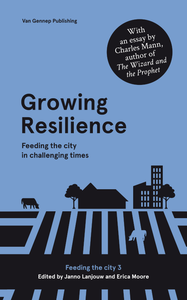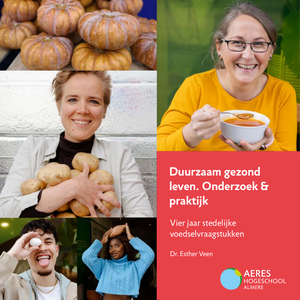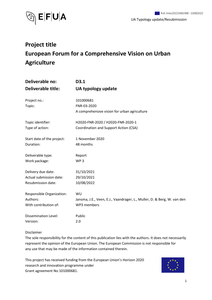Even in a less eventful year, it’s no easy feat: working to make our food supply healthy and sustainable. But 2020 brought a spate of new challenges. It was the year of Brexit, Black Lives Matter, and the COVID-19 pandemic. A year of hope and loss and solidarity, of masks and worries and Zoom calls. Of infection sweeping through the meatpacking industry and sometimes, of empty supermarket shelves. It was also the year that brought us the glimmering realisation that everything could be different. When so much has changed – how we work, who we spend time with, how far we venture from home – what all might be possible for food and for farming? In Flevo Campus’s latest collection of essays, thirteen journalists, scholars, and thought leaders from the US, the Netherlands, and the UK share insight into the question: How can we build resilience into our food supply – and grow more resilient ourselves? Every year, Flevo Campus publishes the best work on feeding the cities of today and tomorrow. This year’s edition includes essays by Stephen Satterfield, Charles C. Mann, Herman Lelieveldt, Hester Dibbits, Kelly Streekstra, Sigrid Wertheim-Heck, Anke Brons, Joris Lohman, Sebastiaan Aalst, Marian Stuiver, Frank Verhoeven, Emily Whyman, and Lenno Munnikes.
DOCUMENT

Deze publicatie beschrijft de 4 jaar van het lectoraat Stedelijke Voedselvraagstukken. Dit wordt gedaan aan de hand van de vijf onderzoekslijnen die zijn ontwikkeld, door telkens de focus van de onderzoekslijn toe te lichten, en te vertellen overde projecten die we hebben gedaan, de publicaties die daaruit zijn voortgekomen, en de studenten die erbij betrokken waren.De behandelde thema's zijn: de multiculinaire voedselomgeving, de eiwittransitie, voedselverspilling, voedsel en armoede, eetgedrag en omgeving van jongeren. Het lectoraat werdgefinancierd door de gemeente Almere, dus het lectoraat bestudeerde de voedselstrategie van de gemeente. En omdat er een duidelijke link met onderzoeks- en actielab Flevo Campus was, zijn de doelen en richting van Flevo Campus ook meegenomen.
DOCUMENT

MULTIFILE
This publication follows and analysis the proces in the region Westerkwartier in the Netherlands in their effort to built a whole new regionale food chain. In this report there is a remarkeble role for the knowledge instutions on vocational and applied level.
DOCUMENT

In celebration of the anniversary of the Hanze University and Academy Minerva in the year 2013, the research group Popular culture, Sustainability and Innovation (Centre of Applied Research and Innovation Art & Society) and Academy Minerva presented the first edition of the Energize Festival for sustainable art, design and lifestyle last November. I am happy to present this limited edition catalogue box with inspiring research posters and one minute movies by our students that formed the heart of the Energize Festival Exhibition. However, before informing you in more detail about the content of this box, I would first like to provide you with some background information on the festival’s theme…
DOCUMENT

How do we increase biodiversity in the Netherlands? By working together! What can food forests and restaurants mean for each other? This report focuses on the question: “What is the potential of collaborations between food forests and restaurants in the Netherlands?”Interviews revealed that successful partnerships are based on direct supplier relationships, internal motivation and niche products that create a unique selling point.
DOCUMENT

Reducing energy consumption in urban households is essential for reaching the necessary climate research and policy targets for CO2 reduction and sustainability. The dominant approach has been to invest in technological innovations that increase household energy efficiency. This article moves beyond this approach, first by emphasising the need to prioritise reducing energy demand over increasing energy efficiency and, second, by addressing the challenge of energy consumption at the level of the community, not the individual household. It argues that energy consumption is shaped in and by social communities, which construct consciousness of the energy implications of lifestyle choices. By analysing a specific type of community, a digital community, it looks at the role that communication on online discussion boards plays in the social process of questioning energy needs and shaping a “decent lifestyle”. The article explores three social processes of community interaction around energy practices – coercive, mimetic, and normative – questioning the ways in which they contribute to the activation of energy discursive consciousness. In conclusion, the article reflects on the potential implications of these social processes for future research and interventions aimed at reducing energy demand. To illustrate how the three selected social processes influence one another, the article builds on the results of a research project conducted in Amsterdam, analysing the potential contribution of online discussion boards in shaping energy norms in the Sustainable Community of Amsterdam Facebook group.
DOCUMENT

Journal in which the Groningen Confucius Institute (GCI) shares different perspectives on China and provides insights into China from as many different aspects as possible. GCI aims to provide a full view of real China to the readers as well as featuring international and comprehensive perspectives, cutting-edge topics, in-depth reporting, classic interpretations and vivid exposition.This edition contains articles by Rien T. Segers, Ingrid Fischer and others.
DOCUMENT

Urban Agriculture (UA) is rapidly evolving and changing and often entails more than the production of food. EFUA’s Working Package 3 therefore aims to identify the types and benefits of UA in the European context. This report is an update of the typology as described in the COST Action UAE. As existing typologies are often based on subjective observation rather than on empirical data and are also one-dimensional, this study is based on a systematic literature review about characteristics and existing typologies of UA, interviews with sixteen experts in the field representing eleven European countries and a questionnaire about specific UA initiatives amongst 112 respondents.
DOCUMENT
